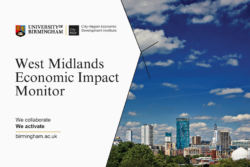Ibtihal Ramadan discusses why intersectionality matters in youth research and employment transitions, particularly for young people in East Birmingham and North Solihull (EBNS). Introduction The population of East Birmingham and North Solihull (EBNS) is young, ethnically diverse, and relatively poor. With a higher-than-average likelihood of being NEET (Not in Education, Employment or Training), there have … Continue reading “Youth Transitions into Good Employment : Why Intersectionality Matters and why it Remains Underutilised in Youth Research?”
Understanding Labour Demand in East Birmingham and North Solihull
In this blog, Dr Kostas Kollydas summarises a briefing co-authored with Professor Anne Green on labour market insights from online job postings in East Birmingham and North Solihull. The analysis forms part of the research project ‘Youth transitions to good employment: East Birmingham & North Solihull’, which is funded by the Nuffield Foundation. Labour demand … Continue reading “Understanding Labour Demand in East Birmingham and North Solihull”
Supporting Regional Innovation Through Research at City REDI
This year marks a major milestone for City-REDI as we celebrate a decade of research, impact, and collaboration. Over the past 10 years, we’ve grown from a bold idea into a leading centre for regional economic development, shaping policy and practice across the UK and beyond. To mark this anniversary, we’re launching a special blog … Continue reading “Supporting Regional Innovation Through Research at City REDI”
Improving Employability and Employment Outcomes for Young People in Greater Birmingham’s Changing Labour Market
The University of Birmingham is launching a Call for Evidence as part of a Commission from the Rigby Foundation to: Compile and review evidence on existing and future employment trends, employers’ labour and skills requirements and insights from employment and skills initiatives focusing on young people Assess what this means for employability and employment outcomes … Continue reading “Improving Employability and Employment Outcomes for Young People in Greater Birmingham’s Changing Labour Market”
Emerging Findings from the Collaborative Value Initiative
Fertilising the soil for greater social impact Organisations looking for ways to measure their contribution to social value are not short of alternatives. The industry around measuring social return on investment has generated proxies, measures and tools for organisations to monetise their social, environmental, economic, health and cultural outcomes. But these tools are often expensive, … Continue reading “Emerging Findings from the Collaborative Value Initiative”
Innovation for Inclusive Growth in Greater Birmingham, from pilots to pipeline
The Birmingham Economic Review is out now! This year’s report will provide a comprehensive analysis of the city’s economy amid the wider geopolitical landscape, and actionable measures that businesses and stakeholders from across the city-region can take to drive economic growth. Read the full Birmingham Economic Review 2025. Dr Gerardo Javier Arriaga Garcia looks at … Continue reading “Innovation for Inclusive Growth in Greater Birmingham, from pilots to pipeline”
Bridging the Innovation Gap: Why Innovation Intermediaries matter for place-based growth
The University of Birmingham’s City-Region Economic Development Institute (City-REDI) has published a new Research & Policy Briefing paper examining the role of innovation intermediaries in shaping regional and national innovation systems. The research underpinning the briefing was supported by funding from Research England Development (RED) Fund. The briefing draws on a mixed-methods research project led … Continue reading “Bridging the Innovation Gap: Why Innovation Intermediaries matter for place-based growth”
Here’s to Ten: A Year at City-REDI, and Why it Matters
This year marks a major milestone for City-REDI as we celebrate a decade of research, impact, and collaboration. Over the past 10 years, we’ve grown from a bold idea into a leading centre for regional economic development, shaping policy and practice across the UK and beyond. To mark this anniversary, we’re launching a special blog … Continue reading “Here’s to Ten: A Year at City-REDI, and Why it Matters”
West Midlands Economic Impact Monitor – 10th December 2025
Global Trends The OECD found that the global economy in 2025 has been more resilient than expected, supported by better financial conditions, AI-driven investment, and macroeconomic policies. The OECD finds significant risks remain including weakening labour markets, potential financial instability (non-bank institutions, crypto volatility), trade barriers, and fiscal pressures that could raise bond yields and … Continue reading “West Midlands Economic Impact Monitor – 10th December 2025”
Beyond ‘what works’, who works, how and at what scales for the civic university: reflections from the Regional Studies Association Conference, Porto May 2025
In a blog, originally published by the National Civic Impact Accelerator, Johannes Read and Matthew Guest reflect on the Regional Studies Association Conference. Building on from the backdrop of a renewed interest in the civic role that universities play in their local areas, members of the National Civic Impact Accelerator (NCIA) team co-led a special session at … Continue reading “Beyond ‘what works’, who works, how and at what scales for the civic university: reflections from the Regional Studies Association Conference, Porto May 2025”










